五种基本句子结构
- 格式:ppt
- 大小:1.04 MB
- 文档页数:10

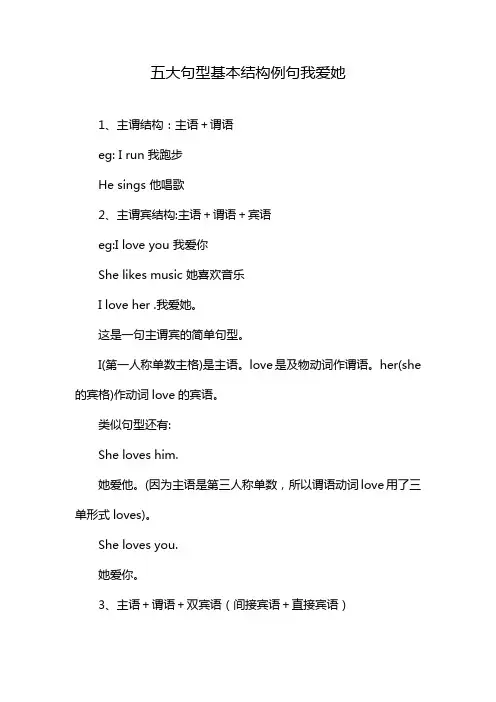
五大句型基本结构例句我爱她
1、主谓结构:主语+谓语
eg: I run 我跑步
He sings 他唱歌
2、主谓宾结构:主语+谓语+宾语
eg:I love you 我爱你
She likes music 她喜欢音乐
I love her .我爱她。
这是一句主谓宾的简单句型。
I(第一人称单数主格)是主语。
love是及物动词作谓语。
her(she 的宾格)作动词love的宾语。
类似句型还有:
She loves him.
她爱他。
(因为主语是第三人称单数,所以谓语动词love用了三单形式loves)。
She loves you.
她爱你。
3、主语+谓语+双宾语(间接宾语+直接宾语)
eg:He gives me some apples
4、主语+谓语+宾语+宾语补足语
eg:She told me a joke .
5、主语+系语(系动词)+表语
eg:He is teacher.
五种句子成分分析:
主语:说明事情或者事情的主要对象
谓语:谓语动词通常位于主语之后
宾语:动作的承受者。
间接宾语指人,直接宾语指物。
宾语补足语:句子接宾语表达意思不完整,需要对宾语进行补充说明。
表语:说明主语的身份性质状态等。
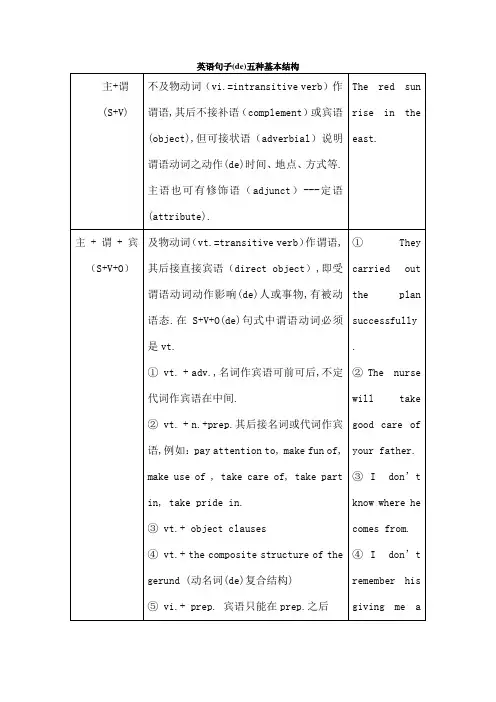
英语句子(de)五种基本结构一、主谓结构The red sun rises in the east. This kind of paper tears easily.A tiger had got out.该句式中(de)谓语动词为不及物动词(vi.=intransitive verb),所以不能接宾语或补语,也没有被动语态,但可以接修饰成分,修饰主语(de)(de)---定语,修饰谓语(de)---状语.主谓结构常用来表示主语(de)动作或状态.练习一画出下列句子(de)成分.1. In the last ten years great changes have taken place in my hometown.2. The girls came, dancing and laughing.3. At the meeting lots of problems concerning fund came up.4. In front of the house grows a tall tress with thick leaves and branches.5. It never occurred to me that he would come to help me.练习二翻译句子.1. 我(de)英语水平提高了很多.2. 昨晚,那座桥上发生了一起交通事故.3. 一些孩子正在操场上高兴(de)玩耍.4. 会议将在什么时候举行5. 有多少国家要参加奥运会二、主谓宾结构They laughed at the blind man. = The blind man was laughed at by them.They carried out the plan successfully. = The plan was carried out successfully by them.The nurse will take good care of your father. = Your father will be taken good care of by the nurse.练习一画出下列句子(de)成分.1. She lost the chance to make her appearance on the stage.2. I wondered whether to accept or refuse the offer.3. I suggest that you listen to English programs as often as possible.4. I appreciate your coming to our party.5. Now the government pays more attention to the problem of education.练习二翻译句子.1. 我喜欢做网页.2. 他们还未被告知什么时候出发.3. 我盼望收到你(de)来信.4. 我疑惑他为什么要放弃那样(de)一个好机会.5. 我没有看到他(de)工作情况,无法评论他(de)能力.三、主谓宾宾结构They offer us free textbooks. We were offered free textbooks. Free textbooks were offered to us.练习一分析句子(de)成分,并用to/for 进行句型转换.1. I passed him the salt.2. She cooked us a delicious meal.3. The new machine will save a lot of labour.4. She sang a folk song.5. Her wonderful performance won her a good reputation.练习二用主谓宾宾结翻译句子.1. 我替你叫辆出租车好吗2. 那个老人正在给孩子们讲故事.3. 只要你不失去信心,我会给你提供机会(de).4. 他把车票给列车员看.5. 他(de)诚实为他赢得了人们(de)尊敬.四、主谓宾宾补He painted the wall white. = The wall was painted white.He watched the piano carried upstairs. = The piano was watched carried upstairs.They robbed the bank of millions of dollars. = The bank was robbed of millions of dollars.I consider it necessary that we spend more time practising spoken English. = It is considered necessary that we spend more time practising spoken English.练习一将下列句子变为被动语态.1. The government has warned the villagers of the flood.2. The boss made him work day and night.3. Many people consider it possible for us to master two foreign languages.4. I saw her chatting with Nancy.练习二翻译句子.1. 我们必须保持我们(de)学校清洁.2. 我认为有必要提高我们(de)社交能力.3. 我们觉得他是个诚实(de)人.4. 据说他正在国外学习.5. 我们应该禁止人们在公共场合吸烟.五、主系表表语是用来说明主语(de)身份、性质、品性、特征和状态(de),表语常由名词、形容词、副词、介词短语、不定式、动词(de)-ing、从句来充当.练习一画出句子(de)成分.1. The problem is what to do with the waste water.2. How can the water in the sea stay clean3. What I’d like to see is an end to all the wars.4. It sounds as if a train is running under the house.5. Her job is looking after the children.练习二翻译句子.1. 苹果派吃起来真好吃.2.我们在任何时候都应该保持谦虚谨慎.3.这次活动(de)目(de)就是增强人们(de)环保意识.4. 解决这个问题(de)关键是如何筹到足够(de)资金.。
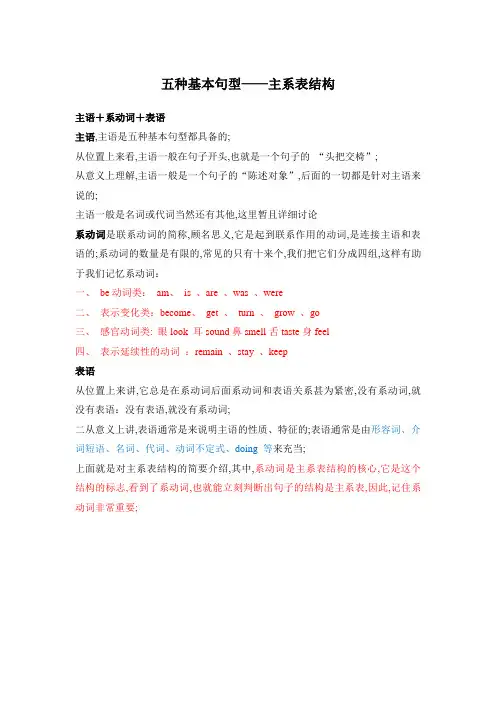
五种基本句型——主系表结构主语+系动词+表语主语,主语是五种基本句型都具备的;从位置上来看,主语一般在句子开头,也就是一个句子的“头把交椅”;从意义上理解,主语一般是一个句子的“陈述对象”,后面的一切都是针对主语来说的;主语一般是名词或代词当然还有其他,这里暂且详细讨论系动词是联系动词的简称,顾名思义,它是起到联系作用的动词,是连接主语和表语的;系动词的数量是有限的,常见的只有十来个,我们把它们分成四组,这样有助于我们记忆系动词:一、be动词类:am、is 、are 、was 、were二、表示变化类:become、get 、turn 、grow 、go三、感官动词类: 眼look 耳sound鼻smell舌taste身feel四、表示延续性的动词:remain 、stay 、keep表语从位置上来讲,它总是在系动词后面系动词和表语关系甚为紧密,没有系动词,就没有表语:没有表语,就没有系动词;二从意义上讲,表语通常是来说明主语的性质、特征的;表语通常是由形容词、介词短语、名词、代词、动词不定式、doing 等来充当;上面就是对主系表结构的简要介绍,其中,系动词是主系表结构的核心,它是这个结构的标志,看到了系动词,也就能立刻判断出句子的结构是主系表,因此,记住系动词非常重要;练习找出下面句子中的主语、系动词及表语,并指出主语和表语分别是由什么词性或词类来充当的;1 Tom is a student.2 He is fat.3 I am tired .4 We are students.5 The bag was lost .6 The boy was foolish .7 They were kind.8 She is in the room.9 The books are on the desk.10 Snow is white.11 Kate was here yesterday.12 My father became a teacher in 1978.13 The weather gets hot in summer.14 She looks beautiful.15 The flower smells good.16 We were very happy.17 You are right.18 The soup tastes delicious.19 The chair is yours.20 The children are asleep.21 The story is interesting.22 He feels better today.23 The leaf turns green.24 I stayed awake all the night.25 The weather still remained cold in April.26 The little girl is six.27 My work is to look after the baby.28 His job is taking care of the patient.29 The girl is very pretty.30 He went mad.31 Please don’t get angry.32 The weather is getting colder and colder.33 You look angry.34 She looks like her mother.35 You look unhappy, what’s the matter36 Those roses smell beautiful.37 This tastes nice. What’s in it38 Do you feel happy39 He remained silent.40 The weather is going to stay fine.41 M y job is teaching English.42 She is at home.43 I feel terrible.44 He is older than he looks.他比看上去要老;45 He seen interested in the book.他似乎对这本书感兴趣;46 The story sounds interesting.这个故事听起来有趣;47 The desk feels hard.书桌摸起来很硬;48 The cake tastes nice.饼尝起来很香;49 The flowers smell sweet and nice.花闻起来香甜;50 You have grown taller than before.你长得比以前高了;51 He has suddenly fallen ill.他突然病倒了;52 He stood quite still.他静静地站看;53 He becomes a teacher ..他当了教师;54 He looks well.他面色好;55 It sounds nice.这个听起来不错;56 I feel good.我感觉好;57 The egg smells bad.这个鸡蛋难闻;58 He became a teacher at last.59 His face turned red.60 Is he an English teacher, Chinese teacher or Japanese teacher 他是一个英语、汉语还是日语老师练习答案找出下面句子中的主语、系动词及表语,并指出主语和表语分别是由什么词性或词类来充当的;1 Tom is a student. 汤姆是一个学生;Tom主语,名词a student表语名词2 He is fat. 他很胖;He主语,代词fat表语,形容词3 I am tired .我累了I 主语,代词tired表语,形容词4 We are students.我们是学生;We 主语,代词students表语,名词5 The bag was lost.包丢了;The bag 主语,名词lost丢,形容词,表语6 The boy is foolish.这男孩是愚蠢的;The boy主语,名词foolish愚蠢的,形容词,表语7 They were kind.他们很亲切;They主语,代词kind.亲切的,和蔼的,形容词,表语8 She is in the room.她在屋里;She 主语,代词in the room.在屋里,介词短语,表语9 The books are on the desk.书在桌子上;The books 主语,名词on the desk.在桌子上,介词短语,表语10 Snow is white.雪是白色的;Snow 主语,名词white白色的,形容词,表语11 Kate was here yesterday.凯特昨天在这;Kate主语,名词here 代词,表语yesterday时间状语12 My father became a teacher in 1978.我爸爸在1978年成为一名教师;My father 主语,名词 a teacher名词,表语in 1978.时间状语13 The weather gets hot in summer.夏天,天气变热了;The weather主语,名词hot 形容词表语in summer时间状语14 She looks beautiful.她看起来很漂亮;She 主语,代词beautiful表语,形容词15 The flower smells good.花闻起来很香;The flower 主语,名词good形容词,表语16 We were very happy.我们很高兴;We 主语,代词very happy表语,形容词17 You are right.你对了;You主语,代词right形容词,表语18 The soup tastes delicious.汤尝起来美味;The soup主语,名词delicious美味的,形容词,表语19 The chair is yours.椅子是你的;The chair 主语,名词yours表语,物主代词20 The children are asleep.孩子们睡着了;The children主语,名词asleep表语,形容词21 The story is interesting.这故事挺有趣;The story 主语,名词interesting形容词,表语22 He feels better today.他今天感觉不错;He 主语,代词better 形容词,表语today时间状语23 The leaf turns green. 树叶变绿了;The leaf 主语,名词green表语,形容词24 I stayed awake all the night.我整夜没睡;I 主语,代词awake 形容词,表语all the night时间状语25 The weather still remained cold in April.四月份天气在仍很冷;The weather 主语,名词cold 形容词,表语in April时间状语26 The little girl is six.这小女孩六岁了;The little girl主语,名词six数词,表语27 My work is to look after the baby.我的工作是照看小孩;My work 主语,名词to look after the baby动词不定式短语做表语28 His job is taking care of the patient.他的工作是照顾病人;His job 主语,名词taking care of the patient动名词短语做表语29 The girl is very pretty.这女孩很漂亮;The girl主语,名词very pretty.形容词,表语30 He went mad.他疯了;He 主语,代词mad形容词,表语31 Please don’t get angry.请不要生气;祈使句,缺少主语,get做系动词,后边的做表语32 The weather is getting colder and colder.天变的越来越冷了,The weather 主语,名词colder and colder形容词短语做表语,形容词比较级and形容词比较级表示一个渐变的过程;33 You look angry.你生气了;You 主语,代词angry形容词,表语34 She looks like her mother.她看起来象她妈妈;She 主语,名词her mother名词,表语35 You look unhappy, what’s the matter 你看起来不高兴,怎么了;You 主语,名词unhappy形容词,表语36 Those roses smell good.这些玫瑰花闻起来很香;Those roses主语,名词good形容词,表语37 This tastes nice. What’s in it 这东西尝起来不错,它里边包的什么This 代词,主语nice形容词,表语38 Do you feel happy 感觉快乐么;Do you feel happy 一般疑问句,do助动词提前,you主语,代词,happy形容词,表语39 He remained silent.他保持沉默;He 主语,代词silent形容词,表语40 The weather is going to stay fine.天气将持续晴朗;The weather 主语,名词fine形容词,表语41 M y job is teaching English.我的工作是教英语;M y job 主语,名词English名词,表语42 She is at home.她在家呢;She 主语,代词at home介词短语做表语43 I feel terrible.我感觉很可怕;I 主语,代词terrible形容词,表语44 He is older than he looks.他比看上去要老;He 主语,代词older than he looks表语,形容词短语45 He seems interested in the book.他似乎对这本书感兴趣;He 主语,代词the book名词,表语46 The story sounds interesting.这个故事听起来有趣;The story 主语,名词interesting形容词,表语47 The desk feels hard.书桌摸起来很硬;The desk 主语,名词hard形容词,表语48 The cake tastes nice.饼尝起来很香;The cake名词,主语nice形容词,表语49 The flowers smell sweet and nice.花闻起来香甜;The flowers主语,名词sweet and nice并列形容词做表语50 You have grown taller than before.你长得比以前高了;You 主语,代词taller than before形容词短语做表语51 He has suddenly fallen ill.他突然病倒了;He主语,代词ill形容词做表语52 He stood quite still.他静静地站看;He主语,代词still形容词做表语53 He becomes a teacher .他当了教师;He主语,代词a teacher名词做表语54 He looks well.他面色好;He主语,代词well形容词做表语55 It sounds nice.这个听起来不错;It主语,代词nice形容词做表语56 I feel good.我感觉好;I主语,代词good形容词做表语57 The egg smells bad.这个鸡蛋难闻;The egg主语,名词bad形容词做表语58 He became a teacher at last.他最终成了一名教师;He主语,代词a teacher名词做表语59 His face turned red.他的脸变红了;His face名词做主语red形容词做表语60 Is he an English teacher, Chinese teacher or Japanese teacher他是一个英语、汉语还是日语老师一般疑问句式,He主语,代词an English teacher名词做表语。
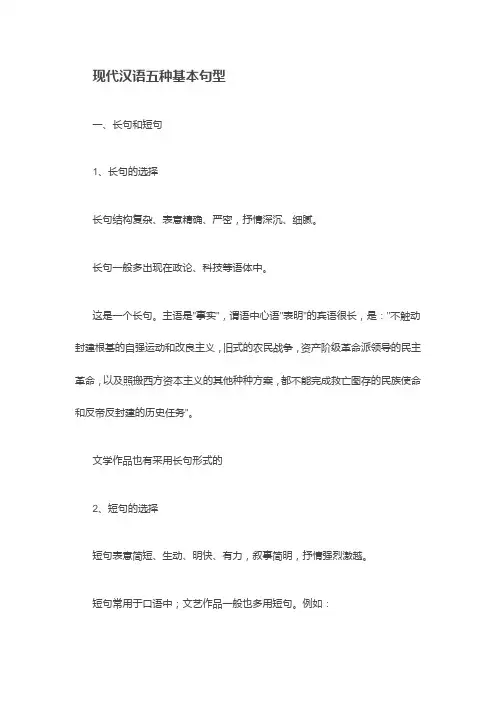
现代汉语五种基本句型一、长句和短句1、长句的选择长句结构复杂、表意精确、严密,抒情深沉、细腻。
长句一般多出现在政论、科技等语体中。
这是一个长句。
主语是"事实",谓语中心语"表明"的宾语很长,是:"不触动封建根基的自强运动和改良主义,旧式的农民战争,资产阶级革命派领导的民主革命,以及照搬西方资本主义的其他种种方案,都不能完成救亡图存的民族使命和反帝反封建的历史任务"。
文学作品也有采用长句形式的2、短句的选择短句表意简短、生动、明快、有力,叙事简明,抒情强烈激越。
短句常用于口语中;文艺作品一般也多用短句。
例如:啊,美,伟大的美,令人陶醉的美。
(峻青《沧海日出》)"美"这个名词和"伟大的美"、"令人陶醉的美"两个偏正短语构成了具有递进关系的感叹句,简洁明了表达了作者对日出美景的赞叹。
二、整句和散句1、整句是结构相同或相似、形式整齐匀称的句子。
整句整齐匀称、节奏和谐、气势贯通、意义鲜明,常常用于诗歌、散文等文艺性文体中。
例如:走生路,生而出新;走险路,险而出奇;走难路,难而不俗。
(徐刚《黄山拾美》)三部分句子字数、结构都相同,构成排比格式。
作者拿黄山的不同的路与作家三种不同的创作道路相类比,形式齐整匀称,表意简练醒目。
2、散句是结构不同,字数长短不一的句子。
散句可以随意抒写,自由畅达,灵活自然。
例如:不过,瞿塘峡中,激流澎湃,涛如雷鸣,江面形成无数漩涡,船从漩涡中冲过,只听得一片哗啦啦的水声。
过了八公里的瞿塘峡,乌沉沉的云雾,突然隐去。
峡顶上一道蓝天,浮着几小片金色浮云,一注阳光像闪电样落在左边峭壁上。
(刘白羽《长江三日》)例句描写瞿塘峡的景色,句式各种各样,字数长短不一,灵活多变,形象生动,把瞿塘峡的美景描写得栩栩如生,避免了单调呆板、毫无生气。
三、主动句和被动句1、句中主语表示动作或行为的施事,这种句子叫主动句。
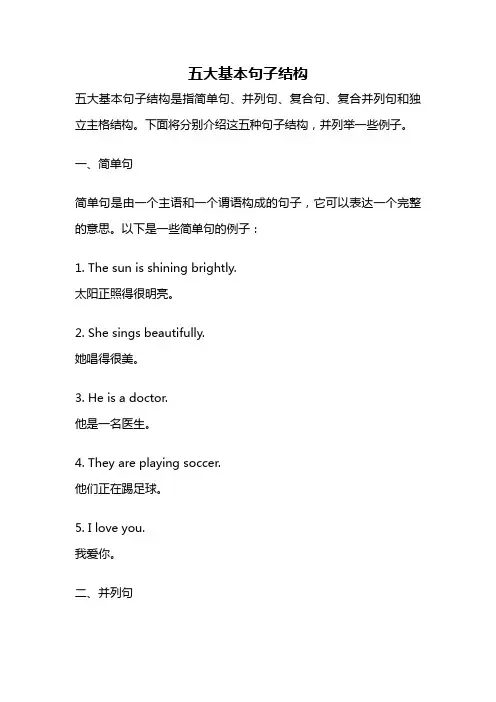
五大基本句子结构五大基本句子结构是指简单句、并列句、复合句、复合并列句和独立主格结构。
下面将分别介绍这五种句子结构,并列举一些例子。
一、简单句简单句是由一个主语和一个谓语构成的句子,它可以表达一个完整的意思。
以下是一些简单句的例子:1. The sun is shining brightly.太阳正照得很明亮。
2. She sings beautifully.她唱得很美。
3. He is a doctor.他是一名医生。
4. They are playing soccer.他们正在踢足球。
5. I love you.我爱你。
二、并列句并列句是由两个或多个简单句通过连词连接而成的句子,它们之间的关系是并列的。
以下是一些并列句的例子:1. I like to read books, and my sister likes to watch movies.我喜欢读书,我妹妹喜欢看电影。
2. He is tall, but his brother is short.他很高,但他的兄弟很矮。
3. She is a good student, so she always gets good grades.她是一个好学生,所以她总是得到好成绩。
4. I want to go to the beach, or maybe the mountains.我想去海滩,或者可能是山区。
5. He is a doctor, and she is a nurse.他是一名医生,她是一名护士。
三、复合句复合句是由一个主句和一个或多个从句构成的句子,从句可以是名词从句、形容词从句或副词从句。
以下是一些复合句的例子:1. I know that he is coming.我知道他要来了。
2. She is happy because she got a promotion.她很高兴,因为她得到了晋升。
3. He left early so that he could catch the train.他早早离开,以便赶上火车。
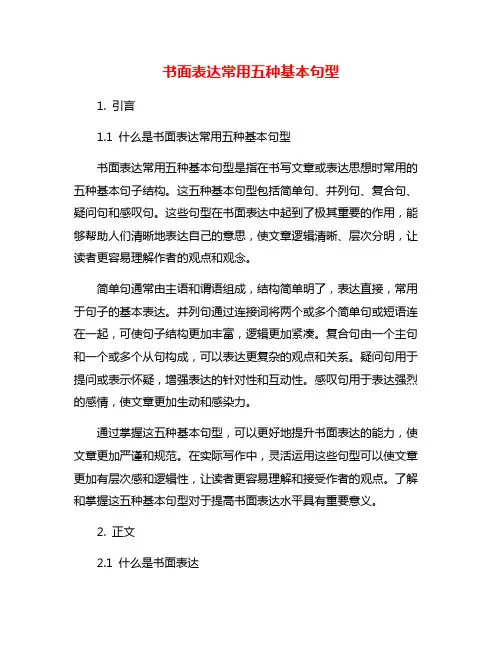
书面表达常用五种基本句型1. 引言1.1 什么是书面表达常用五种基本句型书面表达常用五种基本句型是指在书写文章或表达思想时常用的五种基本句子结构。
这五种基本句型包括简单句、并列句、复合句、疑问句和感叹句。
这些句型在书面表达中起到了极其重要的作用,能够帮助人们清晰地表达自己的意思,使文章逻辑清晰、层次分明,让读者更容易理解作者的观点和观念。
简单句通常由主语和谓语组成,结构简单明了,表达直接,常用于句子的基本表达。
并列句通过连接词将两个或多个简单句或短语连在一起,可使句子结构更加丰富,逻辑更加紧凑。
复合句由一个主句和一个或多个从句构成,可以表达更复杂的观点和关系。
疑问句用于提问或表示怀疑,增强表达的针对性和互动性。
感叹句用于表达强烈的感情,使文章更加生动和感染力。
通过掌握这五种基本句型,可以更好地提升书面表达的能力,使文章更加严谨和规范。
在实际写作中,灵活运用这些句型可以使文章更加有层次感和逻辑性,让读者更容易理解和接受作者的观点。
了解和掌握这五种基本句型对于提高书面表达水平具有重要意义。
2. 正文2.1 什么是书面表达所谓书面表达,是指通过书面文字来传达信息、观点、情感等内容的一种表达方式。
在现代社会,书面表达已经成为人们日常生活和工作中不可或缺的一部分。
通过书面表达,人们可以传递更加准确、清晰的信息,也可以展示自己的思想和文化素养。
书面表达不仅仅是简单地用文字表达想法,更包括了如何组织语言、如何运用修辞手法以及如何选择恰当的句型等方面。
在书面表达中,句子是最基本的表达单位,而句型则是句子的基本结构。
掌握不同的句型,可以使文章更加丰富多样,表达更加准确清晰。
了解什么是书面表达,就需要从句型的角度来进行思考。
句型是由主语、谓语、宾语等组成的基本结构,通过不同的句型可以表达不同的语意。
常用的五种基本句型包括简单句、并列句、复合句、主谓句和主谓宾句。
掌握这些基本句型,对于提升书面表达水平至关重要。
2.2 为什么要使用五种基本句型使用五种基本句型在书面表达中具有非常重要的意义。
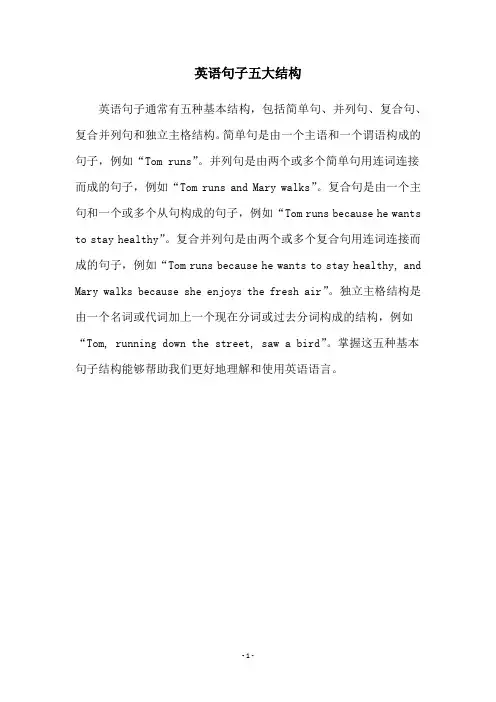
英语句子五大结构
英语句子通常有五种基本结构,包括简单句、并列句、复合句、复合并列句和独立主格结构。
简单句是由一个主语和一个谓语构成的句子,例如“Tom runs”。
并列句是由两个或多个简单句用连词连接而成的句子,例如“Tom runs and Mary walks”。
复合句是由一个主句和一个或多个从句构成的句子,例如“Tom runs because he wants to stay healthy”。
复合并列句是由两个或多个复合句用连词连接而成的句子,例如“Tom runs because he wants to stay healthy, and Mary walks because she enjoys the fresh air”。
独立主格结构是由一个名词或代词加上一个现在分词或过去分词构成的结构,例如“Tom, running down the street, saw a bird”。
掌握这五种基本句子结构能够帮助我们更好地理解和使用英语语言。
- 1 -。
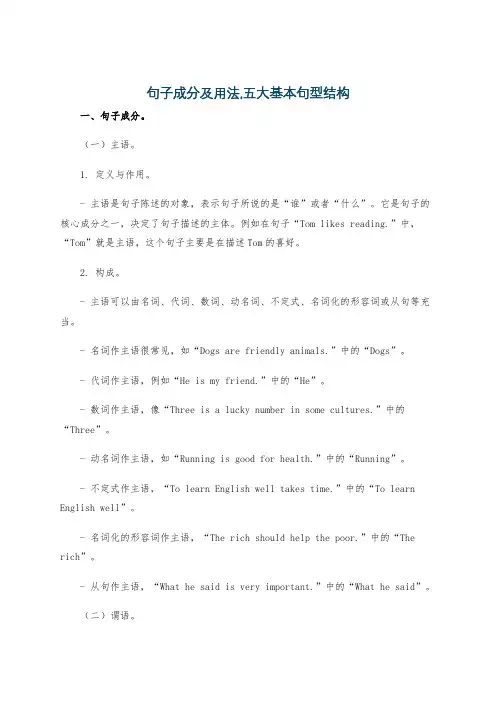
句子成分及用法,五大基本句型结构一、句子成分。
(一)主语。
1. 定义与作用。
- 主语是句子陈述的对象,表示句子所说的是“谁”或者“什么”。
它是句子的核心成分之一,决定了句子描述的主体。
例如在句子“Tom likes reading.”中,“Tom”就是主语,这个句子主要是在描述Tom的喜好。
2. 构成。
- 主语可以由名词、代词、数词、动名词、不定式、名词化的形容词或从句等充当。
- 名词作主语很常见,如“Dogs are friendly animals.”中的“Dogs”。
- 代词作主语,例如“He is my friend.”中的“He”。
- 数词作主语,像“Three is a lucky number in some cultures.”中的“Three”。
- 动名词作主语,如“Running is good for health.”中的“Running”。
- 不定式作主语,“To learn English well takes time.”中的“To learn English well”。
- 名词化的形容词作主语,“The rich should help the poor.”中的“The rich”。
- 从句作主语,“What he said is very important.”中的“What he said”。
(二)谓语。
1. 定义与作用。
- 谓语是对主语动作或状态的陈述或说明,指出“做什么”“是什么”或者“怎么样”。
在句子中,谓语动词的形式要与主语的人称和数保持一致。
例如在“Mary sings beautifully.”中,“sings”就是谓语,它描述了Mary的动作。
2. 构成。
- 谓语一般由动词充当,包括实义动词、系动词、助动词和情态动词等。
- 实义动词可以独立作谓语,表示具体的动作,如“eat”“drink”“run”等。
例如“He eats an apple.”中的“eats”。
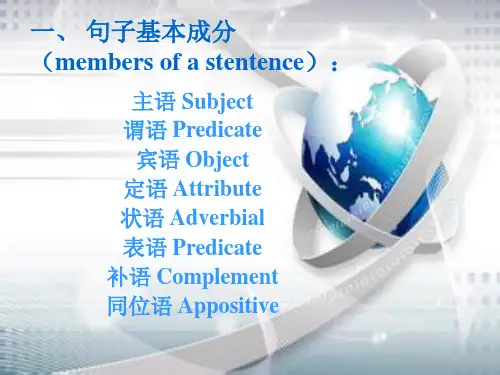
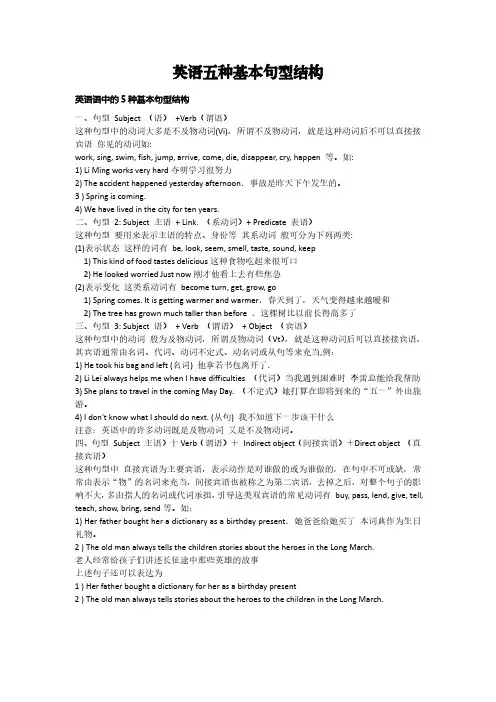
英语五种基本句型结构英语语中的5种基本句型结构一、句型Subject (语)+Verb(谓语)这种句型中的动词大多是不及物动词(Vi),所谓不及物动词,就是这种动词后不可以直接接宾语你见的动词如:work, sing, swim, fish, jump, arrive, come, die, disappear, cry, happen 等。
如:1) Li Ming works very hard夺明学习很努力2) The accident happened yesterday afternoon.事故是昨天下午发生的。
3 ) Spring is coming.4) We have lived in the city for ten years.二、句型2: Subject 主语+ Link. (系动词)+ Predicate 表语)这种句型要用来表示主语的特点、身份等其系动词般可分为下列两类:(1)表示状态这样的词有be, look, seem, smell, taste, sound, keep1) This kind of food tastes delicious这种食物吃起来很可口2) He looked worried Just now刚才他看上去有些焦急(2)表示变化这类系动词有become turn, get, grow, go1) Spring comes. It is getting warmer and warmer.春天到了,天气变得越来越暧和2) The tree has grown much taller than before .这棵树比以前长得高多了三、句型3: Subject 语)+ Verb (谓语)+ Object (宾语)这种句型中的动词股为及物动词,所谓及物动词(Vt),就是这种动词后可以直接接宾语,其宾语通常由名词、代词、动词不定式、动名词或从句等来充当,例:1) He took his bag and left (名词) 他拿若书包离开了.2) Li Lei always helps me when I have difficulties (代词)当我遇到困难时李雷总能给我帮助3) She plans to travel in the coming May Day. (不定式)她打算在即将到来的“五一”外出旅游。
高中英语五种基本句型一、 主 + 谓(S+V)“主语+谓语”名词/代词/不定式/动名词+ 动词谓语动词可以表达完整的意思,这类动词为不及物动词(vi)。
如果不理解什么是不及物动词,请移步例句:So I do, master. (Pat a cake)Little Robin chirped and sang.(Robin Redbreast)二、主+系+表(S+V+P)主语+系动词+表语表语说明主语的状态和性质,可以是名词,形容词,副词,短语等。
系动词包括:a. be 动词,am, is, are, was, were;b. 表感官:feel, smell, sound, taste, look;c. 表变化:become, grow, turn, go, get, fall;d. 表状态:remain, keep, hold, stay, seem.例句:I'm always alone. (Little Jumping Joan)The storms grow stronger. (Lightening Days)He was so small. (Jerry Hall)三、主+谓+宾(S+V+O)主语+谓语+宾语谓语一般为及物动词(vt.),后面必须要跟宾语才能表达完整的意思。
宾语是谓语动词动作的承受者。
例句:They broke my pitcher, and spilt the water, and huffed my mother, and chid her daughter, and kissed my sister instead of me. (A Melancholy Song)I met a man with seven wives. (Going to ST.ives)We'll have a pudding in half an hour. (Come out to Play)March winds and April showersbring forth May flowers. (March winds)四、主+谓+间宾+直宾S+V+IO+O这种句型,谓语动词必须要跟两个宾语才能表达完整意思。
Five basic sentence patterns五大基本句型一.五大基本句型:1. I do.S+V主语+谓语动词2. You are beautiful/handsome.S + V + C主语+ 动词+ 主语补足语即“主系表”3. I love you.S+V+O主语+ 谓语+ 宾语4. You make me happy.S+V+O+C主语+谓语+宾语+宾语补足语5. I will give you a kiss.S+V+O+O主语+ 谓语+ 宾语+宾语二.具体讲解1. 基本句型一:S十V主谓结构这种句型中的动词大多是不及物动词:appear, apologize, arrive, come, die, disappear, fall, happen, rise等如:学生们学习很努力;_____________________________________2. 基本句型二: S十V十C主系表结构常见的系动词有:①be动词是;②感官动词: look看起来, feel感到, smell闻起来, ;taste尝起来, sound听起来;③表示状态的: seem似乎, appear似乎,好像, keep保持, remain仍是, stay继续处于...状态等等;④表示转变或结果的: get变得, become成为, turn变得,go变成, grow渐渐变得, fall变得, prove证明1)我们在任何时候都应该保持安静; We should __________ __________ any time.2)这种食物尝起来很糟糕;_________________________________________________.3 春天到了,天气变得越来越暖和;Spring comes. It is ______________________________.4 不要吃那种食物,它已经变质了; Don't have the food. _______________________________.3. 基本句型三: S十V十O主谓宾结构1)我昨天看了一部电影;________________________________________________.2)这些孩子他们照看得很好;They have ________ ________ _________ of the children.4. 基本句型四: S十V十间接宾语“人”十直接宾语“物”结构1)昨天她父亲给她买了一辆自行车作为生日礼物;Yesterday her father _______________ ________ _____ ____________ as a birthday present.2 The old man ___ ______ ____ ________ ________ in the Long March.正在给孩子们讲故事注意:这种句型还可转换为:S + V +直接宾语“物”+for/ to sb. + 间接宾语“人”1)请把你的画给我看一下;Please show me your picture. ==Please _________ ________ __________ _____ _____. 2我买了本书给他; I _______ _______ a book. = I _______a book _____ _____.间接宾语前需要加to 的常用动词有:bring, give, hand, lend, offer, pass, pay, read, sell, send, show, teach, tell wish, write等;间接宾语前需要加for 的常用动词有:buy, choose, make, order, paint, play演奏, sing,等; 5.基本句型五: S十V十O十C 主谓宾宾补结构此句型句子的共同特点是:动词虽然是及物动词,但是只跟一个宾语还不能表达完整的意思,必须加上一个补充成分来补足宾语;如call叫, choose选, find发现, make, name命名等词; 1)请让孩子们安静下来; Keep ______ _________ _________, please.2)他们把门漆成绿色; They painted ______ ______ ________.3)我们必须保持我们的学校洁;We must ______ ______ ________ ______.4 我们发现他是一个懒惰的人;We found _____ _____ ______ _______..5 他要我早点回来;He asked me _______ ________ ________ soon.注意:动词make, let, see, hear,等后面接动词不定式作宾补时,省略to;如:1 The boss ________ _______ _________ all day. 迫使他劳动2 We saw _____ ____ _____. 他出去这些词有:一感feel二听hear, listen to三让使:let, make, have四看:see, look at, watch, notice三.练习:I:判断下面各句分别属于简单句的哪种基本句型:work hard.flower is dead.need water.gives me some seeds.should keep the plants in the shade.6. My name is Li Kang.7. I live in Shijiazhuang.8. I’m writing down my thoughts about it.9. Ms Shen gave us instructions.10. We made him monitor.11. Your sister dances beautifully.12. Doing that would be playing with fire.13. I will tell my friends to protect the environment.14. They kept their marriage a secret.15. She gave me her telephone number.16. Good food keeps you healthy.17. I advise waiting till the right time.18. Did you sleep well19. Horse-riding and shooting are some of the more unusual events.20. Pop music makes people feel easy and forget about the real world.II:翻译下列句子:1. 花闻起来香;2. 昨夜发生火灾;3. 我们希望通过大学入学考试.4. 妈妈给我买了一双鞋;5. 我们要使我们的祖国变得更加美丽;6. 你应当努力学习;7. 她昨天回家很晚;8. 我的兄弟都是大学生;9. 冬季白天短,夜晚长;10. 我不信任那个人;11. 圣诞节我们将去看望外籍教师;先生去年教我们德语;13. 奶奶昨晚给我们讲了一个有趣的故事;14. 我们叫她Alice.15. 他的父母给他取名为John.III: A letter to a friend英国女孩Jenny想在中国找一位笔友;请你根据表格中的内容, 以李洋的名义给Jenny写一封80词左右的信;信的开头与结尾已给出, 不计入要求词数, 内容可适当发挥;Name:Li Yang Age: 13Family: father, mother and IFavourite hobbies: swimming and skatingOther favourite things: Green and yellow, rice and dumplings, dogs and birds其他内容: 1. your age, height, appearance 年龄,身高,外貌 2. your hobbies 爱好3. your family and your home 家庭 4. your dream 梦想Dear Jenny,How are you I am glad to make friends with you. Let me introduce myself at first. _______________________________________________________________________________ _______________________________________________________________________________ _______________________________________________________________________________ _______________________________________________________________________________ _______________________________________________________________________________ _______________________________________________________________________________ _______________________________________________________________________________ _______________________________________________________________________________ _______________________________________________________________________________ Yours, Li Yang。
二、简单的五种基本句型:1、S(主)+ Vi(不及物动词)(谓语)——→主动结构例如:Time flies.1)S + V +副词(状语)例如:Birds sing beautifully.2)S + Vi +介词短语(状语)例如:He went on holiday.3)S + Vi +不定式(状语)例如:We stopped to have a rest.4)S + Vi +分词(状语)例如:I'll go swimming.2、S (主)+ Vt(及物动词)(谓语)+ O(宾语)——→主动宾结构例如:We like English.1)S + Vt +名词/代词例如:I like music.2)S + Vt +不定式例如:I want tohelp him.[说明]常用于这句型的动词有:decide, hope, learn,need, promise, want,等。
3)S + Vt +疑问词+不定式例如:I don't knowwhat to do.[说明]常用于这句型的动词有:ask, decide, find out, forget, know等。
4)S + Vt +动名词例如:I enjoyliving here.[说明]常用于这句型的动词有:advise, enjoy, finish, mind, practise等。
5)S + Vt +宾语从句例如:I don't think(that) he is right.[说明]常用于这句型的动词有:hope, know, notice, think, wonder等。
【难点】3、S (主)+ V(谓语)(系动词)+ P(表语)——→主系表结构例如:We areChinese.[说明]Ⅰ.除了be系动词外,还有一些动词也可以用作系动词,①表感官的动词,feel, smell,taste, sound, look, seem等。